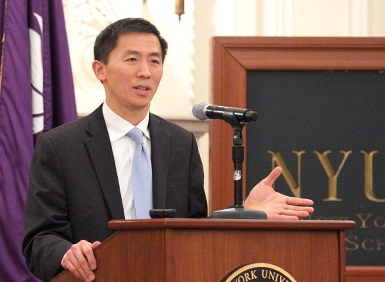Justice Goodwin Liu discusses the challenges facing Asian Americans in the legal profession
In this year’s Korematsu Lecture, Justice Goodwin Liu, associate justice of the Supreme Court of California, examined the troubling paradox of why Asian Americans, despite being the fastest growing minority group in the legal profession, struggle to reach the top ranks of the field. The annual lecture—named in honor of Fred Korematsu, the plaintiff who challenged Japanese internment during World War II—is sponsored by the Asian Pacific American Law Students Association and serves as a forum to address Asian American perspectives on the law and to honor Asian Americans who have contributed to the development of the law.
Liu observed that when Dale Minami, the Japanese American lawyer who led a team of attorneys to reopen and win Fred Korematsu’s case in 1983, graduated from law school in 1971, there were fewer than 500 Asian American law students in the country. Since then, Asian American representation in the legal profession has increased dramatically. The number of Asian American lawyers has grown from about 10,000 in 1990 to about 55,000 today, and Asian Americans constitute five percent of all lawyers in the US. But they continue to face challenges, Liu noted.
“Asian Americans have made tremendous gains in the legal profession over the past 30 years, but we have yet to penetrate the very top ranks of the profession in significant numbers,” said Liu, who in 2017 coauthored “A Portrait of Asian Americans in the Law,” based on a survey of more than 600 Asian American lawyers and data from a range of sources.
Asian Americans constitute 10.3 percent of students at the top 30 schools, but only receive 6.5 percent of federal judicial clerkships, according to Liu’s report. Since 2009, Asian American first-year enrollment in law school has dropped 43 percent, the largest decrease across all groups; in the fall of 2016, the number of Asian American 1Ls was at its lowest level in 20 years.
A study by the American Bar Foundation found that Asian Americans graduate from law school with the lowest debt and the highest salaries in their initial years of practice, but also have the lowest satisfaction. Asian Americans have been the largest minority group at major law firms for nearly two decades, but their numbers are concentrated in the associate ranks, Liu pointed out. Asian Americans have the highest ratio of associates to partners: 3.65:1.
Liu’s 2017 report found that a lack of mentoring was most frequently cited as an obstacle to career advancement.
“Despite having good educations and objectively strong skills, Asian Americans seem to struggle with the subjective or less tangible prerequisites for career advancement, and have difficulty navigating the unwritten structure of the workplace,” said Liu. “To the extent that mentoring and networking are based on perceptions of sociability and conformity with cultural norms, Asian Americans may face obstacles rooted in stereotyped perceptions of being foreign, socially awkward, or unassimilable.”
The judge encouraged students to consider how they present themselves in the workplace. “I hear from a lot of students, ‘I’m not good at public speaking. I’m not good at networking,’” said Liu. “Look, no one likes those things. These skills are acquired and learned and practiced. Just as you learn how to write a good contract, you also have to be very intentional about learning how to speak well, how to go to a cocktail party, how to be sociable in a room. That is how most people develop the relationships that enable advancement in most settings.”
Liu added that he is interested in exploring some of his research findings further, including the high attrition rates among Asian Americans at law firms and their relatively low representation in clerkships and in government. Among attorneys in the federal government, nine percent were Asian Americans, but only 5.6 percent of attorneys at the highest civil service pay grades were Asian Americans.
“Greater penetration into these public leadership roles is critical to increasing the influence of Asian Americans throughout the profession and society,” said Liu.
Posted March 12, 2018


